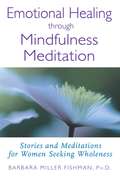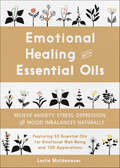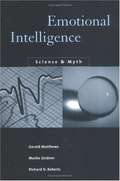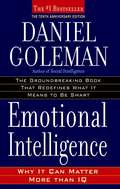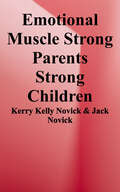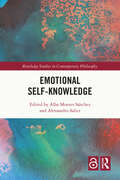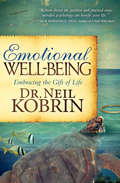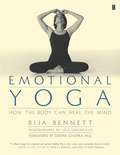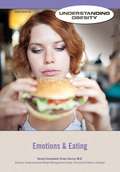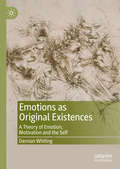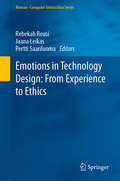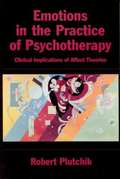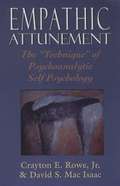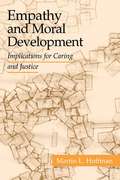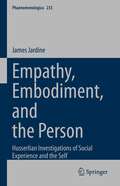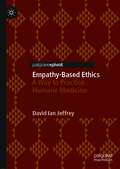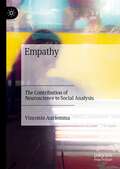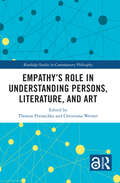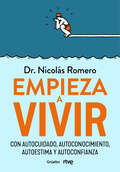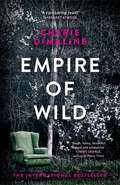- Table View
- List View
Emotional Healing through Mindfulness Meditation: Stories and Meditations for Women Seeking Wholeness
by Barbara Miller FishmanExplores how women can heal deep emotional pain through a new therapeutic approach that combines mindfulness meditation with psychotherapy. • Includes 8 vivid stories of women overcoming great emotional pain and life obstacles through Mindfulness Psychotherapy. • Each story is followed by a discussion and a relevant mindfulness meditation. As a result of her years of working with women as a psychotherapist, Barbara Miller Fishman developed the discipline of Mindfulness Psychotherapy--a combination of mindfulness meditation and psychotherapy that, taken together, describe a path toward wholeness. Now she presents the integration of her life's work through the poignant stories of eight women--all faced with critical decisions and tough life circumstances--and how they used Mindfulness Psychotherapy to attain greater levels of peace and well-being. The author offers a radical shift in a woman's relationship to life. Readers will discover the importance of naming a life problem, accepting the "is-ness" of it, developing a matter-of-fact curiosity, and exploring the mind/body reactions that we call emotional pain. The path continues as the reader creates an observing self and discovers the deep compassion that ultimately heals. Once learned, these six awareness practices can be used to face difficult situations, discover self-acceptance, and release the love needed to reside fully in one's whole self.
Emotional Healing with Essential Oils: Relieve Anxiety, Stress, Depression, and Mood Imbalances Naturally
by Leslie MoldenauerDiscover emotional healing power in a few drops of essential oil.You may already know essential oils can help heal your body—but what about your emotional state? Emotional Healing with Essential Oils shows you how to harness the power of aromatherapy to help relieve stress and anxiety, boost your mood, and increase your emotional resilience.A must-have for those new and not-so-new to essential oils, this guide lays out the most useful oils and the most beneficial application methods for your individual needs.Emotional Healing with Essential Oils includes:Mind-body wellness—Move beyond physical healing and experience the effectiveness of essential oils in treating your mental health.50 oil profiles—Explore the emotional healing applications, properties, and safety guidelines for a variety of individual essential oils.100 unique blends—Support your health with specific blends to treat insomnia, seasonal blues, food cravings, attention deficit, and more.Let the healing begin with Emotional Healing with Essential Oils.
Emotional Health
by Bob JohnsonEmotions have been banished to the periphery for too long - time to put them back at the very heart of our human lives where they belong.
Emotional Intelligence of visually impaired
by Amruta PandaThis book has been an attempt to find out the relation which exist in terms of emotional intelligence, level of aspiration and educational achievement of different categories of visually impaired adolescent girls studying in various settings.
Emotional Intelligence: Science and Myth
by Gerald Matthews Moshe Zeidner Richard D. RobertsEmotional intelligence (EI) is one of the most widely discussed topics in current psychology. Although first mentioned in the professional literature nearly two decades ago, in the past five years it has received extensive media attention.
Emotional Intelligence: Why It Can Matter More Than IQ
by Daniel GolemanEveryone knows that high IQ is no guarantee of success, happiness, or virtue, but until Emotional Intelligence, we could only guess why. Daniel Goleman's brilliant report from the frontiers of psychology and neuroscience offers startling new insight into our "two minds"--the rational and the emotional--and how they together shape our destiny. Through vivid examples, Goleman delineates the five crucial skills of emotional intelligence, and shows how they determine our success in relationships, work, and even our physical well-being. What emerges is an entirely new way to talk about being smart. The best news is that "emotional literacy" is not fixed early in life. Every parent, every teacher, every business leader, and everyone interested in a more civil society, has a stake in this compelling vision of human possibility.
Emotional Muscle: Strong Parents, Strong Children
by Kerry Kelly Novick Jack NovickThis book offers parents, grandparents, teachers and all who work with children useful ways to build EMOTIONAL MUSCLE. Your child can develop emotional muscles, like trust and adaptability for babies, empathy and agency in one-year-olds, resilience and mastery in two-year-olds, assertion and persistence in three-year-olds, internal controls and realistic standards in four-year-olds, cooperation and competence in five-year-olds and more. With these added strengths, your child will become a good friend to others, a responsible helper, a self-motivated learner, and be successful in meeting life's challenges. Emotional Muscle creates character.
Emotional Self-Knowledge (Routledge Studies in Contemporary Philosophy)
by Alessandro Salice Alba Montes SánchezThis volume sheds light on the affective dimensions of self-knowledge and the roles that emotions and other affective states play in promoting or obstructing our knowledge of ourselves. It is the first book specifically devoted to the issue of affective self-knowledge. The relation between self-knowledge and human emotions is an often emphasized, but poorly articulated one. While philosophers of emotion tend to give affectivity a central role in making us who we are, the philosophical literature on self-knowledge focuses overwhelmingly on cognitive states and does not give a special place to the emotions. Currently there is little dialogue between both fields or with other philosophical traditions that have important contributions to make to this topic, such as phenomenology and Asian philosophy. This volume brings together philosophers from the relevant fields to explore two related sets of questions: First, do philosophers of emotion exaggerate the importance of our affective lives in making us who we are? Or is it philosophers of self-knowledge who misunderstand emotions? Second, what is the role of emotions in self-knowledge? What sort of self-knowledge can be secured by paying attention to our emotions? Emotional Self-Knowledge is an essential resource for researchers and advanced students working on philosophy of emotion, philosophy of mind, epistemology, philosophical psychology, and phenomenology.
Emotional Well-Being: Embracing the Gift of Life
by Dr. Neil Kobrin&“A deep, piercing look at what it takes to dissolve our roadblocks to happiness. There is insight on every page&” (Marianne Williamson, #1 New York Times–bestselling author). Emotional Well-Being provides a rich illustration of how we developed emotionally and what we can do as adults to lead a happier, more meaningful life. It is written in a practical, highly accessible manner and has universal appeal because it deals with the human condition. It delves into concepts such as impermanence, letting go, life perspective, compassion, emotional health, non-attachment, constructs, context and many other areas. It blends content with numerous stories from popular films, television series, Eastern philosophy and professional and personal references. &“Dr. Neil Kobrin provides a very lucid and accessible integration of psychology and mindfulness . . . The author includes personal anecdotes and illustrative case examples to show the relevance and intersection of these two perspectives.&” —Harville Hendrix, PhD, bestselling author of Getting the Love You Want &“Kobrin shows the positive and practical ways mindful psychology can benefit your life.&” —Jack Kornfield, PhD, author of A Path with Heart
Emotional Yoga
by Bija BennettDrawing on her extensive training in yoga therapy, dance, and meditation, Bija Bennett has created a groundbreaking yoga program that takes full advantage of the body-mind connection. Based on the classical eightfold path of yoga, Emotional Yoga offers a broad range of simple body-mind techniques that can positively affect our emotional well-being, including the dynamic interplay of movements, breathing exercises, meditations, lifestyle skills, rituals, gestures, and healing sounds. Each technique is presented in a way that is true to Bennett's background in the tradition of Viniyoga, which allows the reader to adapt the program to his or her specific needs.
Emotional Yoga: How the Body Can Heal the Mind
by Bija BennettA groundbreaking yoga program that takes full advantage of the body-mind connection.Drawing on her extensive training in yoga therapy, dance, and meditation, Bija Bennett has created a groundbreaking yoga program that takes full advantage of the body-mind connection. Based on the classical eightfold path of yoga, Emotional Yoga offers a broad range of simple body-mind techniques that can positively affect our emotional well-being, including the dynamic interplay of movements, breathing exercises, meditations, lifestyle skills, rituals, gestures, and healing sounds. Each technique is presented in a way that is true to Bennett's background in the tradition of Viniyoga, which allows the reader to adapt the program to his or her specific needs.
Emotions & Eating
by Joan EsherickWe all need to eat. Food is a basic life necessity, but it can mean so much more to us than merely taking in enough food to keep hunger at bay. We eat when we're sad, happy, bored, lonely, excited, and for many other reasons. Many people have complicated relationships with food and their emotions. For many of us, eating is a way to escape painful feelings. For others, no good feeling can go without a celebratory meal--and maybe even some overeating. But all this emotional eating can lead to serious health consequences, including obesity--the state of being very overweight. Learn more about why people's emotions push them to eat the way they do, and discover how people develop unhealthy emotional relationships with food. When you understand the risks of eating because of your emotions, you'll be able to understand your body's needs better--and you'll know how to stick with healthy eating, no matter how you're feeling.
Emotions as Original Existences: A Theory of Emotion, Motivation and the Self
by Demian WhitingThis book defends the much-disputed view that emotions are what Hume referred to as ‘original existences’: feeling states that have no intentional or representational properties of their own. In doing so, the book serves as a valuable counterbalance to the now mainstream view that emotions are representational mental states. Beginning with a defence of a feeling theory of emotion, Whiting opens up a whole new way of thinking about the role and centrality of emotion in our lives, showing how emotion is key to a proper understanding of human motivation and the self. Whiting establishes that emotions as types of bodily feelings serve as the categorical bases for our behavioural dispositions, including those associated with moral thought, virtue, and vice.The book concludes by advancing the idea that emotions make up our intrinsic nature - the characterisation of what we are like in and of ourselves, when considered apart from how we are disposed to behave. The conclusion additionally draws out the implications of the claims made throughout the book in relation to our understanding of mental illness and the treatment of emotional disorders.
Emotions in Technology Design: From Experience to Ethics (Human–Computer Interaction Series)
by Pertti Saariluoma Jaana Leikas Rebekah RousiUnderstanding emotions is becoming ever more valuable in design, both in terms of what people prefer as well as in relation to how they behave in relation to it. Approaches to conceptualising emotions in technology design, how emotions can be operationalised and how they can be measured are paramount to ascertaining the core principles of design. Emotions in Technology Design: From Experience to Ethics provides a multi-dimensional approach to studying, designing and comprehending emotions in design. It presents emotions as understood through basic human-technology research, applied design practice, culture and aesthetics, ethical approaches to emotional design, and ethics as a cultural framework for emotions in design experience. Core elements running through the book are: cognitive science – cognitive-affective theories of emotions (i.e., Appraisal); culture – the ways in which our minds are trained to recognise, respond to and influence design; and ethics – a deep cultural framework of interpretations of good versus evil. This ethical understanding brings culture and cognition together to form genuine emotional experience. This book is essential reading for designers, technology developers, HCI and cognitive science scholars, educators and students (at both undergraduate and graduate levels) in terms of emotional design methods and tools, systematic measurement of emotion in design experience, cultural theory underpinning how emotions operate in the production and interaction of design, and how ethics influence basic (primal) and higher level emotional reactions. The broader scope equips design practitioners, developers and scholars with that ‘something more’ in terms of understanding how emotional experience of technology can be positioned in relation to cultural discourse and ethics.
Emotions in the Moral Life
by Robert C. RobertsRobert C. Roberts extends to the moral life the account of emotions presented in his Emotions: An Essay in Aid of Moral Psychology (2003), that they are "concern-based construals." In this book the author explains how emotions can be a basis for moral judgments, how they account for the deeper moral identity of actions we perform, how they are constitutive of morally valenced personal relationships like friendship, enmity, collegiality and parenthood, and how both pleasant and unpleasant emotions interact with our personal wellbeing (eudaimonia). He argues that none of these dimensions of emotions' values is reducible to any of the others. He continues by sketching how all of these moral dimensions contribute to emotions' participation, in diverse ways, in our virtues and vices.
Emotions in the Practice of Psychotherapy
by Robert PlutchikThe circumplex model of emotions has been an extremely valuable paradigm for understanding personality, psychopathology, and interpersonal relations over the past 30 years. In this volume, Robert Plutchik extends his model to inform the practice of psychotherapy across all theoretical orientations and therapeutic modalities. Beginning with a description of the role of emotions in symptom formation, Plutchik demonstrates how the circumplex model has relevance not only to emotions, but to personality traits, personality disorders, and ego defenses as well. He presents a unique compendium of therapist tactics for uncovering emotions and encouraging their expression. He examines the many distinctions between social conversation and therapeutic communication and describes specific strategies of intervention found to be helpful to therapeutic enterprise.
Empathic Attunement: The "Technique" of Psychoanalytic Self Psychology
by Crayton E. Rowe David S. MacisaacEmpathic Attunement captures the essence of Kohut's contributions to self psychology and the mental health field. Straightforward, accurate, and practical, the authors introduce student and experienced clinician alike to the synthesis of Kohut's major concepts and their clinical applications. The authors highlight Kohut's emphasis on the empathic mode of data gathering from within the patient's experiences. Kohut considers empathy--the capacity to think and feel oneself into the inner life of another person--to be the major tool of therapy.
Empathy and Moral Development: Implications for Caring and Justice
by Martin L. HoffmanThis volume provides the first comprehensive account of prosocial moral development in children. The book's focus is empathy's contribution to altruism and compassion for others in physical, psychological, or economic distress; feelings of guilt over harming someone; feelings of anger at others who do harm; feelings of injustice when others do not receive their due.
Empathy, Embodiment, and the Person: Husserlian Investigations of Social Experience and the Self (Phaenomenologica #233)
by James JardineThis text explores how self-consciousness and self-understanding differ phenomenologically from the experience and comprehension of others, and the extent to which such relations are constitutively interdependent.Jardine argues that Husserl’s analyses of selfhood and intersubjectivity are animated by the question of what's at stake in recognising an agent’s engagement as the situated response of a person, rather than simply as the comportment of an animal or living body. Drawing centrally from the freshly excavated Ideas II drafts and manuscripts, the author develops Husserl’s often fragmentary investigations of attention, habit, emotion, freedom, the common world, and action, and considers their implications for subjectivity and the experience of others. Empathy, Embodiment, and the Person also brings Husserlian phenomenology into dialogue with twenty-first century philosophical concerns, from accounts of selfhood and agency from analytic philosophy to the treatment of social experience in critical theory.The book shows the reader that transcendental phenomenology can be rejuvenated by engaging with a broader philosophical landscape and will appeal to researchers, students, and instructors in the field.
Empathy-Based Ethics: A Way to Practice Humane Medicine
by David Ian JeffreyThis book explores a new way of applying clinical ethics. Empathy-based ethics is based on the patient–doctor relationship and seeks to encourage a more humane form of medical practice. The author argues that the current emphasis on the biomedical model of medicine and a detached concern form of professionalism have damaged the patient–doctor relationship. He investigates examples of the dehumanization of patients and demonstrates a contrasting view of humane care. The book presents empathy as a relational construct - it provides an in-depth analysis of the process of empathizing. It discusses an empathy-based ethics approach underpinned by clinical examples of the practical application of this new approach. It suggests how empathy-based ethics can be embedded in clinical practice, medical education and research. The book concludes by examining the challenges in implementing such an approach and looks to a future which redresses the current imbalance between biomedical and psychosocial approaches to medicine.
Empathy: The Contribution of Neuroscience to Social Analysis
by Vincenzo AuriemmaThis book examines the concept of empathy in sociological and neuroscientific discourses using innovative perspectives from sociology and social neuroscience. Through a transdisciplinary approach, the author delves into the history of empathy and its social, cultural and semantic changes, and then reviews the conception of empathy in neuroscientific discourse.Distancing itself from the traditional neuroscientific literature of biological universalism, this volume offers an innovative perspective on empathy. It also opens a new avenue for neurosociology, which is presented as the discipline that can emphasize all the cultural and emotional aspects that govern empathy. Key themes addressed in the text are: empathy in all its meanings, from Hume to TenHouten; neurosociology as one possible avenue for embracing the cultural and neuroscientific aspects of empathy; and empirical research. A valuable resource for sociology students and academics in the field of empathy and neurosociology, this book is also of interest to those studying sociological thought, and social neuroscience.
Empathy’s Role in Understanding Persons, Literature, and Art (Routledge Studies in Contemporary Philosophy)
by Thomas Petraschka and Christiana WernerThis volume critically discusses the role empathy plays in different processes of understanding. More precisely, it clarifies empathy’s role in interpersonal understanding and appreciating works of literature and art. The volume also includes a section on historical theories of empathy’s role in understanding. When it comes to understanding other persons, empathy is typically seen as a process that enables the empathizer to recognize a target person’s mental states, a process which is in turn seen as “understanding” this person. This volume, however, explores empathy’s role in understanding beyond mere mental state recognition. With contributions on processes of interpersonal understanding and understanding of literature and art, it provides readers with an overview over both differences and similarities regarding empathy’s epistemic role in two rather different areas. Since important roots of the debate about empathic understanding lie at the end of the nineteenth and the beginning of the twentieth century, the historical section of the volume focusses specifically on this period. Empathy’s Role in Understanding Persons, Literature, and Art will appeal to scholars and advanced students working in the philosophy of mind, epistemology, aesthetics and the history of philosophy, as well as in literary studies and art history.
Empecemos de cero
by Lucía FernándezLa popular figura de TikTok, Lucía Fernández, nos cuenta las luces y sombras de ser una influencer. Todo lo que escriba aquí va a quedar para siempre y eso nunca va a cambiar. ¡Hola, yo soy Lucía Fernández! Puede que algunos ya me conozcáis por las redes sociales o por mi canal de YouTube, pero quizás otros no sabéis nada de mí. Por eso, me gustaría que me conocierais a través de este libro donde he querido plasmar mis sentimientos. Empecemos de cero lo he dividido en dos partes, porque creo que así es como soy yo: en la primera tenéis a la Lucía que ve todo el mundo día a día y a través de las redes sociales, donde incluiré mi infancia y mi adolescencia (y algunos secretos), y en la segunda parte encontraréis lo que muy pocas personas pueden ver de mí, lo que siento en cada momento y que a veces me cuesta compartir. Bienvenidos a mi vida. Espero que disfrutéis este libro que es tan necesario para mí. ¡Nos vemos pronto!
Empieza a vivir: Con autocuidado, autoconocimiento, autoestima y autoconfianza
by Dr. Nicolás Romero RTVEEl doctor de la tele en La aventura del saber nos propone tirarnos a la piscina para que nos pasen mejores cosas en la vida. Empieza a vivir es un método de aprovechamiento personal para autoengañarnos menos, cambiar de mentalidad y reforzarnos para las crisis del futuro siguiendo cuatro autos: - Autocuidado. Mejora tu sistema inmunitario y las funciones de tu cerebro con inmunonutrición.- Autoconocimiento. Forma hábitos y habilidades que desarrollen tu talento potencial.- Autoestima. Identifica las personas que te dañan con la envidia y lastran tu vida.- Autoconfianza. Aumenta la seguridad y siente más control en las decisiones importantes. Con este libro, el doctor Nicolás Romero nos ofrece una herramienta útil para sentirnos más contentos con lo que somos y desarrollar el talento que ya tenemos, con ejemplos para que nos vaya mejor a partir de ahora.
Empire of Wild: A Novel
by Cherie DimalineA #1 INTERNATIONAL BESTSELLEROne of the most anticipated books of the summer for Time, Harper's Bazaar, Bustle and Publishers Weekly'Deftly written, gripping and informative. Empire of Wild is a rip-roaring read!' Margaret Atwood'Empire of Wild is doing everything I love in a contemporary novel and more. It is tough, funny, beautiful, honest and propulsive' Tommy Orange, author of There There 'Dimaline turns an old story into something newly haunting and resonant' New York Times'Close, tight, stark, beautiful - rich where richness is warranted, but spare where want and sorrow have sharpened every word. Dimaline has crafted something both current and timeless' NPR'Revelatory... Gritty and engaging, this story of a woman and her missing husband is one of candor, wit and tradition'Ms. Magazine Broken-hearted Joan has been searching for her husband, Victor, for almost a year - ever since he went missing on the night they had their first serious argument. One hung-over morning in a Walmart parking lot in a little town near Georgian Bay, she is drawn to a revival tent where the local Métis have been flocking to hear a charismatic preacher. By the time she staggers into the tent the service is over, but as she is about to leave, she hears an unmistakable voice.She turns, and there is Victor. Only he insists he is not Victor, but the Reverend Eugene Wolff, on a mission to bring his people to Jesus.With only two allies - her Johnny-Cash-loving, 12-year-old nephew Zeus, and Ajean, a foul-mouthed euchre shark with deep knowledge of the old Métis ways - Joan sets out to remind the Reverend Wolff of who he really is. If he really is Victor, his life and the life of everyone she loves, depends upon her success.Inspired by traditional Métis legends, Cherie Dimaline has created a propulsive, stunning and sensuous novel.
